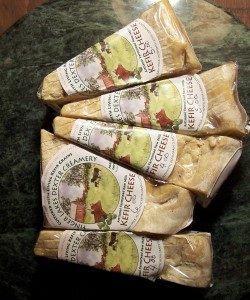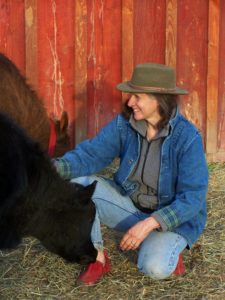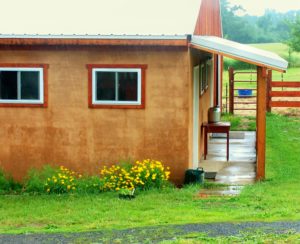Inventive Farmer Brings Kefir Cheese to Market
Rose Marie Belforti scaled up a home recipe for raw milk kefir cheese to a commercial process
THE FARM
Finger Lakes Dexter Creamery begins its story when two town dwellers with a passion for farming, a lot of patience, a thirst for knowledge and an empty nest find their way back to the country. In 1999 Rose Marie Belforti and her husband purchased a 12 acre farm in Ledyard, NY and acquired a little dun heifer from a distant neighbor. Their one cow grew into a small herd and Rose’s small farm dream evolved into a business plan for a small-scale cheese company. When her farmstead cheese plant became certified in 2006, she started producing the first known commercially available kefir cheese cultured with authentic living kefir grains. This unique cheese is made even more unusual by its main ingredient: the rich, creamy milk from her small herd of rare heritage Dexter cattle. To her knowledge, Rose operates the only commercial Dexter creamery in theUnited States.
THE SARE GRANT
Rose received a SARE grant in July of 2006 to fund the transformation of her home recipe for an aged raw milk kefir cheese to a commercial standard. According to Rose, “Kefir grains have been used for centuries to culture milk by traditional peoples, promoting good health and longevity”. Although there are kefir products available on the market, they are not made with kefir grains and therefore lack the beneficial probiotic organisms. She worked with the Cornell University Food Processing and Development Laboratory to create, record and document the kefir cheese recipe as it materialized.
Rose stressed the importance of carefully reviewing a grant’s requirements when considering applying. She felt that her project – scaling up a healthy home recipe for a new micro-dairy — was a good match for SARE with its emphasis on innovation and sustainability. She also attributed her success to thorough attention to detail in explaining her project. “As you plan your outline for meeting the requirements of the grant, make lots of notes, make sure you answer questions very specifically, and write very clear and concise sentences” says Rose.
BEYOND THE GRANT
In summer of 2007, Rose and Cornell Food Processing had completed the brand new raw milk kefir cheese which is aged at least 60 days and contains full cream. Her next goal is to grow her small Dexter herd to a maximum of six milking cows. Rose and her husband continue to rely on ingenuity to source the equipment they need as appropriate technology for micro-dairies is not widely available in theUnited States. Currently they employ a refrigerator/freezer as a bulk tank and use a couple old jacketed steam kettles to warm the milk and start the kefir culture. The cheese is aged in several refrigerators, but plans are already underway to expand to a bigger space.
STARRING DEXTER CATTLE

The new raw milk kefir cheese is aged at least 60 days and contains full cream. Photo by Rose Belforti
Rose has an enthusiastic appreciation for the Dexter Cattle that have come to be the foundation of both her business and way of life. She describes the thick, creamy, butterfat rich milk they produce as “exquisite” and although Dexters are naturally small in size, praises their “work power”. Her cattle mother their calves as long as possible and have plenty of access to pasture. She believes providing the best care for her cows equates to the best quality milk and well-being of everyone involved. She stresses her humane approach as “very important in a world where dairying seems to forget the value of the very one that gives us the treasure she has”.
REVIVING THE ART
Perhaps the most remarkable aspect of Finger Lakes Dexter Creamery is its perseverance in a business that virtually no one remembers – the small farmstead dairy based on breeds modern agriculture left behind. With only a few websites and a handful of published resources, Rose was grateful to the few Dexter “experts” she made acquaintance with. Beryl Rutherford, a life-long Dexter breeder inEnglandnow in her eighties, provided sanity-saving advice in every facet of training, treating, hand-milking and dairying from across the seas. “She was always getting me out of troubles – I owe her a lot!” says Rose.
Despite the steep learning curve, Rose and her husband are as determined as ever to continue developing the niche dairy they dreamed of. She insists that they have found success working with even the most stubborn of cows; “Don’t let anyone ever tell you a Dexter cannot be milked!” It is her hope that Finger Lakes Dexter Creamery serves as an inspiring example to other artisanal cheese start-up operations looking to incorporate heritage breeds. And if her energetic spirit and reverence for Dexters hasn’t caught your interest yet, taste the cheese – it is certainly destined to set a trend.
Editors Note: In February 2010, Rose was approved for a second SARE grant to develop a standard for Kefir Cheese Spread and establish benchmarks for aging a raw milk cheese spread.
To see a step by step documentation of the creation of Rose’s Kefir cheese, visit the SARE final report.
To learn more about Finger Lakes Dexter Creamery, visit their website.
Resource Spotlight
Upcoming SARE Grant Deadlines
Sustainable Agriculture Grad Student Scholarships – Due May 31, 2010
Northeast SARE is now offering grants to graduate students doing research in sustainable agriculture. The grant will allow the student, under the supervision of a faculty advisor, to explore topics that will benefit farmers and add to our understanding of sustainable farm systems. Awards are capped at $15,000 and can run up to two years, and the money can be used for labor, materials, and other direct costs associated with a research effort. Proposals can cover a wide range of topic areas — cropping systems, pest management, livestock health, farm energy production, soil quality, or the institutional purchase of local food, for example. Proposals can be submitted on line from mid-April until May 31, 2010. To learn more, go to the Northeast SARE web site.
SARE Professional Development Grants – Preproposals due late May
Northeast SARE Professional Development grants build the knowledge base and educational infrastructure so that Cooperative Extension educators and other agricultural professionals can get and use the knowledge they need to help farmers move toward greater sustainability. The beneficiaries of Professional Development projects are extension staff, NRCS personnel, and a range of other agricultural service providers like crop consultants, veterinarians, energy advisors, and suppliers. The program emphasis is on training the trainers, disseminating sustainable practices and technologies, advancing new content, and seeking measurable, verifiable change that leads to the improved and widespread practice of agricultural sustainability. The preproposal, a brief concept document, is submitted online, usually in late in May. The SARE Administrative Council decides which preproposals will progress to full proposals in July. Full proposals are due in the fall, usually late October or early November. Learn more here.
SARE Research and Education Grants – Preproposals due late May
Northeast SARE seeks proposals for research, education and on-farm demonstration projects, and the emphasis is on projects that lead directly to improved farming practices and an enhanced quality of life for farmers and rural communities. Projects must involve farmers and other stakeholders in planning, implementing, and evaluating a potential project; we also fund projects where research, Cooperative Extension, and education are closely linked. The beneficiaries of Research and Education projects are farmers, and the emphasis is on farmers making measurable changes that enhance sustainability through improved profits, better stewardship, and stronger farm communities. Projects designed to have a secondary influence on the behavior of consumers and the general public are also within the scope of the program, and we encourage proposals that recognize the interaction between the farm and the community. The preproposal, a brief concept document, is submitted online, usually in late in May. Applicants whose projects have been selected to proceed will be notified in August. Full proposals are due in the fall, usually late October or early November. Learn more here.
SARE Agroecosystems Grants – Preproposals due late May
Northeast SARE seeks preproposals for long-term research projects that will explore the ecological interactions that are the basis of sustainable agriculture. The goal is to develop a greater understanding of these interactions and to promote new models of farming systems designed around them so that in the future farmers will be able to minimize the use of external, energy-dependent inputs while optimizing the use of on-site natural resources to maintain productivity. Applicants for Agroecosystems Research grants should have experience doing agricultural research, preferably using a collaborative, holistic approach. All applicants must demonstrate a firm grasp of current barriers and issues in sustainable agriculture and have a strong multidisciplinary team prepared to see the project through to completion. The preproposal, a brief concept document, that is submitted online, is usually due in late in May. Applicants whose projects have been selected to proceed will be notified in August. Full proposals are due in the fall, usually late October or early November. Learn more here.
Learn more about the Northeast SARE program by visiting their site or by contacting Northeast SARE 655 Spear Street University of Vermont, Burlington VT 05405 Phone (802) 656-0471 Fax (802) 656 -0500 E-mail: nesare@uvm.edu.



